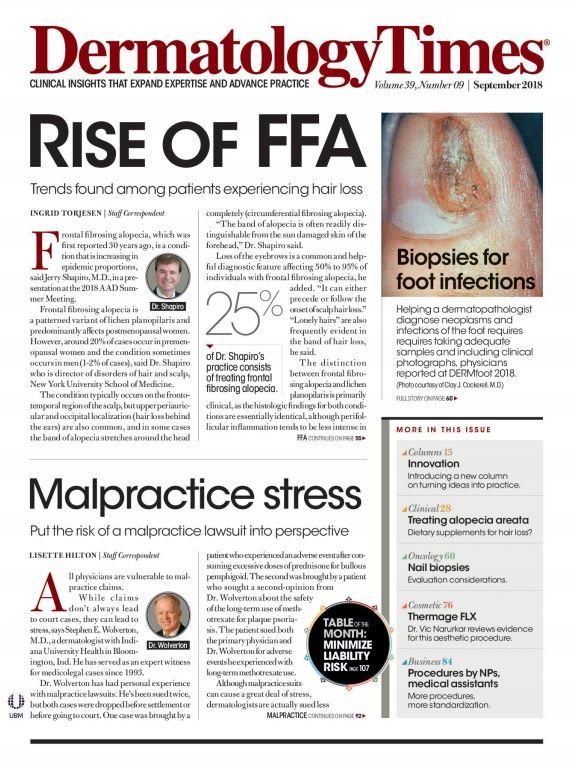- Acne
- Actinic Keratosis
- Aesthetics
- Alopecia
- Atopic Dermatitis
- Buy-and-Bill
- COVID-19
- Case-Based Roundtable
- Chronic Hand Eczema
- Chronic Spontaneous Urticaria
- Drug Watch
- Eczema
- General Dermatology
- Hidradenitis Suppurativa
- Melasma
- NP and PA
- Pediatric Dermatology
- Pigmentary Disorders
- Practice Management
- Precision Medicine and Biologics
- Prurigo Nodularis
- Psoriasis
- Psoriatic Arthritis
- Rare Disease
- Rosacea
- Skin Cancer
- Vitiligo
- Wound Care
Publication
Article
Dermatology Times
Spironolactone as effective as antibiotics
Author(s):
Dermatologists should consider using the diuretic drug spironolactone to treat acne in women instead of antibiotics, researchers report.
Dermatologists should consider using the diuretic drug spironolactone to treat acne in women instead of antibiotics, researchers at the University of Pennsylvania School of Medicine have said after their study found it to be similarly effective.i
They found that rates of prescription switching over a year were similar for women originally prescribed spironolactone and those originally prescribed antibiotics for their acne. Switching prescriptions is a proxy for ineffectiveness, since a change of drug is often the result of treatment failure due to lack of efficacy, side effects, cost, or other factors.
Despite antibiotics being associated with a range of adverse outcomes and efforts to curb their use because of growing antimicrobial resistance, oral antibiotics remain the most common systemic agent prescribed for the treatment of acne in the U.S. According to the Centers for Disease Control, and dermatologists are the specialty which prescribe the highest level of antibiotics per provider.
Spironolactone, which blocks the effects of male hormones, meaning it's not a treatment option for men, is increasingly used to treat women with moderate to severe acne, despite not having been approved by the Food and Drug Administration for this indication. However, the clinical evidence to support its use is limited to small studies, so the researchers sought to compare the outcomes for spironolactone and oral tetracycline-class antibiotics among a larger population of women with acne.
They conducted a retrospective analysis of the frequency of switching to a different systemic agent within the first year of therapy among 6,684 women and girls prescribed spironolactone and 31,614 prescribed an oral tetracycline-class antibiotic between 2010-2016.
Their results, published in Journal of Drugs and Dermatology, revealed that 14.4% of women with acne who were started on spironolactone were prescribed a different systemic agent within one year, compared with 13.4% who started on an oral tetracycline-class antibiotic. After adjusting for age, topical retinoid, and oral contraceptive use, the odds ratio for being prescribed a different systemic agent within one year was 1.07 (95% confidence interval [CI] 0.99-1.16) for those prescribed spironolactone when compared with oral tetracycline-class antibiotics.
The researchers concluded that, based on the observation of similar switching between the two groups, spironolactone may have similar clinical effectiveness to that of oral tetracycline-class antibiotics.
Spironolactone could provide a safe and effective alternative to antibiotics for women, the study's lead author John S. Barbieri, MD, MBA, Dermatology chief resident at Penn, told Dermatology Times.
“Our results highlight that in this population of women being treated for acne, the rate of switching to another treatment was similar among those started on spironolactone and those started on an oral antibiotic for their acne. These results suggest that spironolactone may have similar effectiveness to oral antibiotics for women with acne,” he said. “Guidelines currently recommend oral antibiotics as one of the first-line treatments for moderate to severe acne. However, given the emerging evidence regarding the effectiveness of spironolactone coupled with the potential risks of antibiotic resistance and other complications associated with antibiotic use, spironolactone should be discussed as an alternative option for women with acne.”
In addition to the importance of antibiotic stewardship, long-term oral antibiotic use may be associated with lupus, inflammatory bowel disease, and even colon and breast cancer. Spironolactone is generally well tolerated, with the most common side effect being irregular menstrual periods, which typically improve by using a lower dose or starting an oral contraceptive pill. However, it should be prescribed with caution to those with a history of kidney, heart, or liver disease and not taken by women who are pregnant.
Despite expert opinion supporting the use of spironolactone for the treatment of acne in women, more clinical evidence on its safety and efficacy is needed, Barbieri acknowledged. “Ultimately, there would be significant benefit from a large clinical trial comparing spironolactone to oral antibiotics to provide definitive evidence regarding the safety and efficacy of spironolactone in the treatment of acne,” he said.
“If future studies continue to demonstrate the effectiveness and safety of spironolactone, then potentially it should replace oral antibiotics as the most common treatment of women with moderate to severe acne.”
REFERENCE
Barbieri JS, Choi JK, Mitra N, Margolis DJ. Frequency of Treatment Switching for Spironolactone Compared to Oral Tetracycline-Class Antibiotics for Women With Acne: A Retrospective Cohort Study 2010-2016. Journal of Drugs and Dermatology 2018; 17 (6): 611-617

Newsletter
Like what you’re reading? Subscribe to Dermatology Times for weekly updates on therapies, innovations, and real-world practice tips.





















